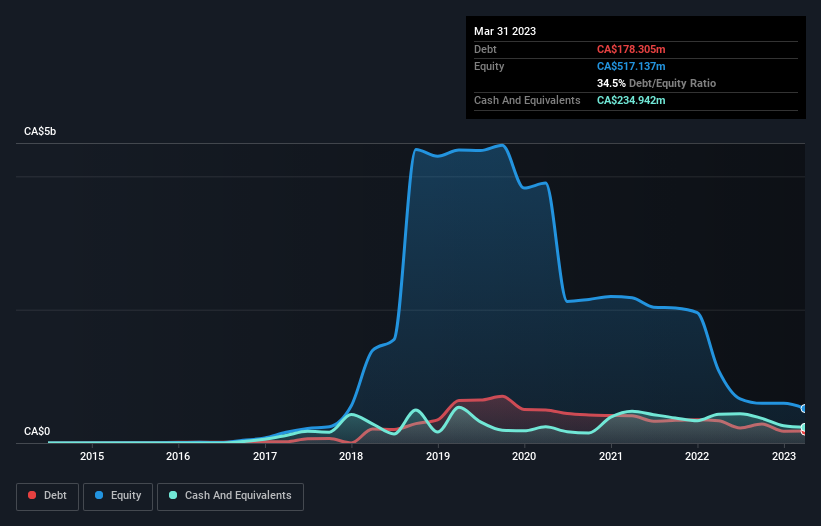Howard Marks put it nicely when he said that, rather than worrying about share price volatility, 'The possibility of permanent loss is the risk I worry about... and every practical investor I know worries about.' It's only natural to consider a company's balance sheet when you examine how risky it is, since debt is often involved when a business collapses. As with many other companies Aurora Cannabis Inc. (TSE:ACB) makes use of debt. But is this debt a concern to shareholders?
When Is Debt A Problem?
Generally speaking, debt only becomes a real problem when a company can't easily pay it off, either by raising capital or with its own cash flow. If things get really bad, the lenders can take control of the business. While that is not too common, we often do see indebted companies permanently diluting shareholders because lenders force them to raise capital at a distressed price. Of course, plenty of companies use debt to fund growth, without any negative consequences. The first thing to do when considering how much debt a business uses is to look at its cash and debt together.
View our latest analysis for Aurora Cannabis
How Much Debt Does Aurora Cannabis Carry?
The image below, which you can click on for greater detail, shows that Aurora Cannabis had debt of CA$178.3m at the end of March 2023, a reduction from CA$334.0m over a year. But on the other hand it also has CA$234.9m in cash, leading to a CA$56.6m net cash position.

How Healthy Is Aurora Cannabis' Balance Sheet?
We can see from the most recent balance sheet that Aurora Cannabis had liabilities of CA$242.3m falling due within a year, and liabilities of CA$166.9m due beyond that. Offsetting these obligations, it had cash of CA$234.9m as well as receivables valued at CA$41.3m due within 12 months. So it has liabilities totalling CA$132.9m more than its cash and near-term receivables, combined.
This deficit isn't so bad because Aurora Cannabis is worth CA$482.4m, and thus could probably raise enough capital to shore up its balance sheet, if the need arose. But it's clear that we should definitely closely examine whether it can manage its debt without dilution. Despite its noteworthy liabilities, Aurora Cannabis boasts net cash, so it's fair to say it does not have a heavy debt load! When analysing debt levels, the balance sheet is the obvious place to start. But ultimately the future profitability of the business will decide if Aurora Cannabis can strengthen its balance sheet over time. So if you want to see what the professionals think, you might find this free report on analyst profit forecasts to be interesting.
Over 12 months, Aurora Cannabis saw its revenue hold pretty steady, and it did not report positive earnings before interest and tax. While that hardly impresses, its not too bad either.
So How Risky Is Aurora Cannabis?
We have no doubt that loss making companies are, in general, riskier than profitable ones. And we do note that Aurora Cannabis had an earnings before interest and tax (EBIT) loss, over the last year. Indeed, in that time it burnt through CA$164m of cash and made a loss of CA$818m. With only CA$56.6m on the balance sheet, it would appear that its going to need to raise capital again soon. Overall, we'd say the stock is a bit risky, and we're usually very cautious until we see positive free cash flow. There's no doubt that we learn most about debt from the balance sheet. However, not all investment risk resides within the balance sheet - far from it. For example, we've discovered 2 warning signs for Aurora Cannabis (1 is a bit concerning!) that you should be aware of before investing here.
At the end of the day, it's often better to focus on companies that are free from net debt. You can access our special list of such companies (all with a track record of profit growth). It's free.
New: Manage All Your Stock Portfolios in One Place
We've created the ultimate portfolio companion for stock investors, and it's free.
• Connect an unlimited number of Portfolios and see your total in one currency
• Be alerted to new Warning Signs or Risks via email or mobile
• Track the Fair Value of your stocks
Have feedback on this article? Concerned about the content? Get in touch with us directly. Alternatively, email editorial-team (at) simplywallst.com.
This article by Simply Wall St is general in nature. We provide commentary based on historical data and analyst forecasts only using an unbiased methodology and our articles are not intended to be financial advice. It does not constitute a recommendation to buy or sell any stock, and does not take account of your objectives, or your financial situation. We aim to bring you long-term focused analysis driven by fundamental data. Note that our analysis may not factor in the latest price-sensitive company announcements or qualitative material. Simply Wall St has no position in any stocks mentioned.
About TSX:ACB
Aurora Cannabis
Engages in the production, distribution, and sale of cannabis and cannabis-derivative products in Canada and internationally.
Excellent balance sheet and good value.
Similar Companies
Market Insights
Community Narratives




